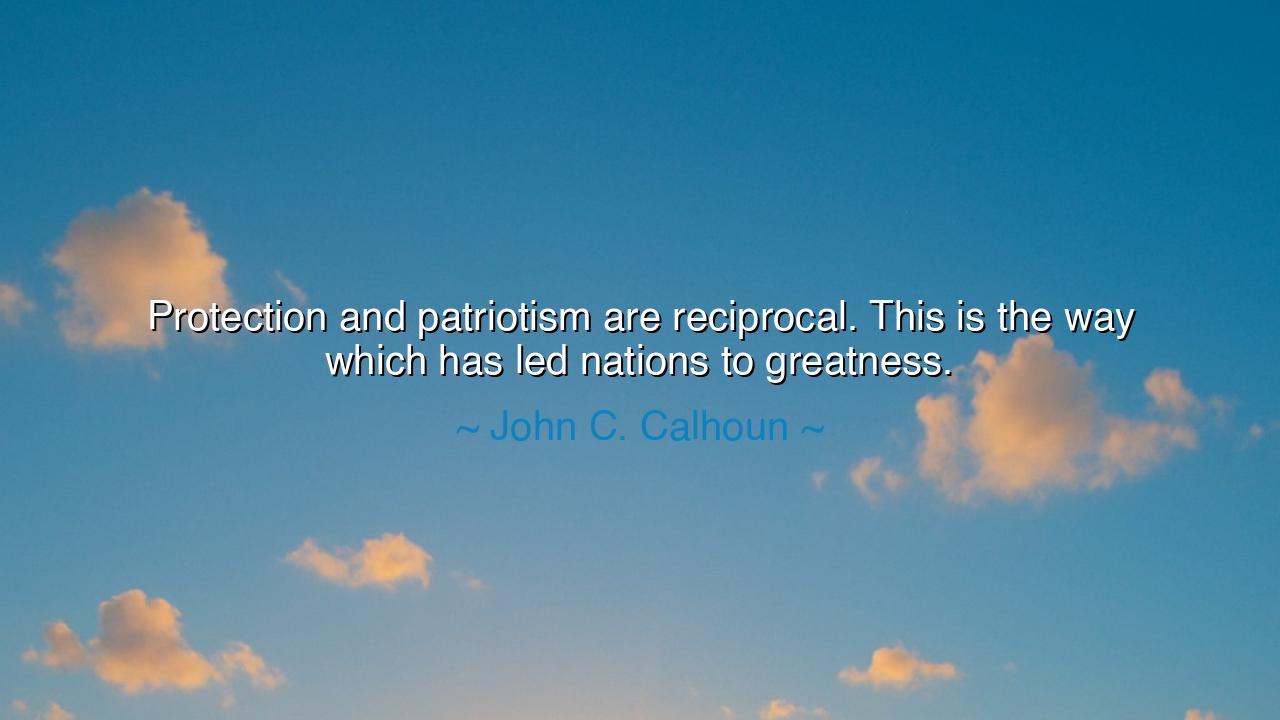
Protection and patriotism are reciprocal. This is the way which
Protection and patriotism are reciprocal. This is the way which has led nations to greatness.






The words of John C. Calhoun—“Protection and patriotism are reciprocal. This is the way which has led nations to greatness.”—carry the weight of ancient truth, though spoken in a fiery age of American struggle. In them lies a profound recognition: a nation thrives when the rulers and the ruled uphold one another in mutual duty. The people give their patriotism—their loyalty, their labor, their sacrifice—and in return, the state gives its protection—its justice, its shelter, its defense. When this sacred exchange is honored, the bonds of trust are unbreakable, and the nation rises like an unshaken mountain.
The ancients, too, knew of this eternal reciprocity. The Roman Republic grew mighty because its citizens fought with fierce devotion, secure in the belief that Rome would guard their rights, their land, and their posterity. The legion marched with pride because it knew the Senate was bound to the people’s welfare. In this balance of protection and patriotism, Rome found her greatness. Yet when emperors demanded loyalty without giving justice in return, the bond frayed, and the empire collapsed under the weight of its broken covenant.
Calhoun himself, though a man of controversy, spoke from within the storms of a young republic. He saw that for America to rise, there had to be more than blind devotion from its people; there had to be a government strong enough, and just enough, to protect their livelihoods, their industries, and their families. His words reflect the wisdom that no patriotism can endure long if it is repaid with neglect, nor can any protection stand without the living fire of a people’s loyalty.
History offers many mirrors. Consider the bond between Winston Churchill and the British people during World War II. The people gave their patriotism—enduring the Blitz, rationing food, sending their sons to distant fronts. In turn, their government gave protection—organizing defense, rallying allies, and standing unyielding against tyranny. Because both sides honored the bond, Britain stood unconquered, and from that shared sacrifice arose greatness. Contrast this with nations where rulers demand sacrifice yet offer no security in return—there, trust dies, loyalty crumbles, and greatness fades.
The meaning of the quote, then, is not only political but deeply human. At its heart, it teaches that all relationships of power and loyalty must be reciprocal. Just as a nation must guard its citizens, so must a family guard one another, and a leader protect those who follow. Patriotism is not blind submission; it is a covenant. And protection is not tyranny; it is service. Together they form the lifeblood of enduring societies, the way that leads to greatness.
The lesson for us is clear: we must demand and uphold this balance in our own time. Citizens must give loyalty not as flattery, but as service to the common good—through honesty, hard work, and unity. Leaders must give protection not as privilege, but as duty—through justice, fairness, and courage. When either side breaks this covenant, decay begins. But when both honor it, greatness is within reach.
Practical action flows from this wisdom. As a citizen, live your patriotism not merely in words, but in deeds—serve your community, respect your fellow citizens, and carry your share of the common burden. As leaders, whether of families, towns, or nations, give protection in the form of fairness, guidance, and security, so that those who follow you may do so gladly. Teach your children that love of country is bound not only to loyalty but to justice, for only when both are joined can a nation truly flourish.
Thus Calhoun’s words remain a torch across time: protection and patriotism must forever walk hand in hand. This is the path of Rome, of Britain in her darkest hour, of every people who has risen to greatness. Let us remember: if we demand loyalty, we must give protection. If we seek greatness, we must honor the covenant of justice. Only then shall a people endure, and only then shall a nation shine like a star upon the horizon of history.






AAdministratorAdministrator
Welcome, honored guests. Please leave a comment, we will respond soon